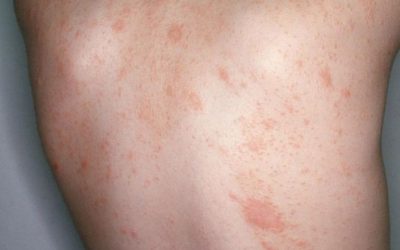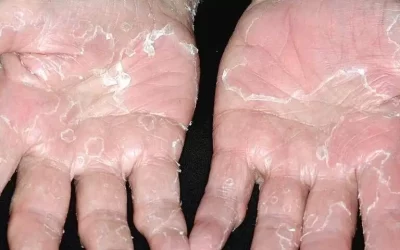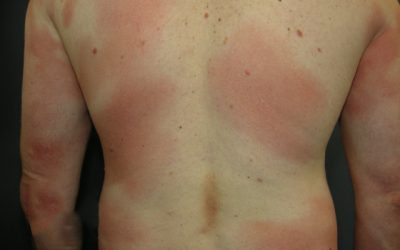Nummular Eczema
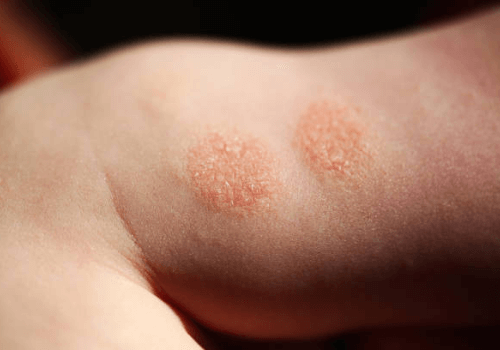
Nummular Eczema is an itchy inflammation of the skin manifested by coin-sized red scaly spots and plaques. Chronic course, non-infectious, prone to recurrence, untreated can last for about a year. The exact cause of coin dermatitis is still not known.
Clinical Signs
- It begins with a papule or small vesicle, which increases in number, coalesces and forms a red, round or oval spots, plaques.
- The size of the rash can be from 1 cm to 10 cm in diameter.
- As the disease continues, the surface of the rash begins to peel, and the skin at the site of damage thickens a little.
- If the rash is itchy, the itching is worse after bathing, especially if soap is used, after warming up.
- It mostly affects the limbs, it can be in the torso area.
- Rashes of this disease never appear on the face or scalp.
- As the rash worsens, a change in pigmentation remains for some time in the rashed areas – the skin in these areas darker.
- Heals without scarring
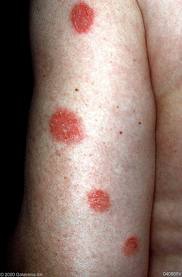
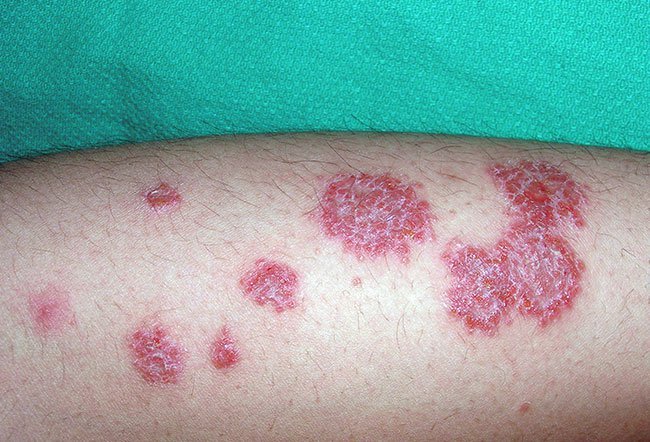
- tendency to dry skin, atopic dermatitis
- tendency to contact allergies or sensitization to environmental factors
- frequent and long bathing with hot water
- irritating detergents and soap are used for washing
- dry environment (when the ambient humidity is less than 30%)
- wearing tight, rough cloth clothes
- some medicines, e.g. use of antiviral or immunosuppressive drugs
- chronic venous insufficiency of the legs
Diagnostics.
It is diagnosed based on the characteristic clinical picture – coin-shaped or oval-shaped red spots, plaques. If the rash is more scaly or infiltration is felt when palpated, additional tests may be performed to clarify the diagnosis:
- skin biopsy
- microscopic examination for fungus
- allergen patch test if contact allergy is suspected
Treatment.
Topical hormonal preparations or calcineurin inhibitors are prescribed. In more complex cases, when the rash has spread or does not respond to medication, phototherapy or oral medication may be prescribed.
Round, coin-like spots can manifest various diseases: fungal infection, impetigo (bacterial infection), granuloma annulare, rosacea, psoriasis, fixed skin reaction to drugs, even cutaneous T-cell lymphoma, so self-medicate without consulting a family doctor or dermatovenerologist we do not recommend?
If you notice redness, dryness accompanied by itching, before visiting a doctor, we recommend:
- wash with cooler water, limiting the duration of washing to 5 minutes.
- for washing, use gentle, sensitive skin cleansers, preferably oily ones
- immediately after washing, while the skin is still damp, apply moisturizing (summer) or nourishing (oilier, in winter) cream. Choose products without added fragrances.
- wear looser, natural fiber clothes, avoid wool

Pityriasis rosea
An acute, self-limiting, exanthematic skin disease that manifests as itchy, somewhat inflammatory, scaly rashes, usually on the torso, chest, and upper limbs.
Peeling skin syndrome
Peeling skin syndrome is a genetic disorder characterized by constant peeling of the skin. The disease appears from birth or in the first year of life
lasts a lifetime
Mycosis Fungoides
The most common primary skin T-cell lymphoma (cancer of the blood). Mycosis Fungoides is characterized by three main stages, several of which may exist at the same time
iDerma
MB iDerma
Fabijoniškių g. 99, Vilnius
+370 671 33323
info@iderma.lt

